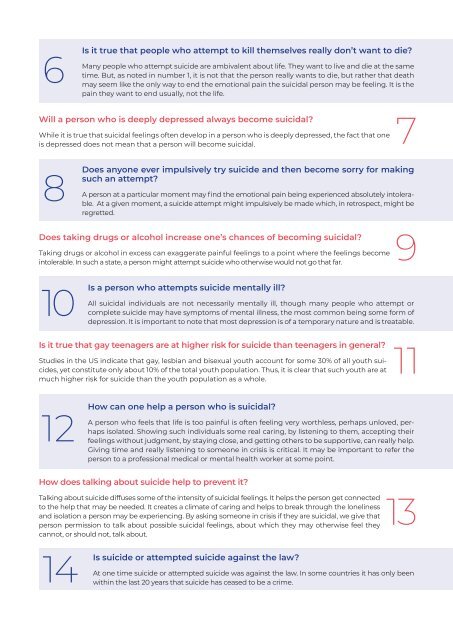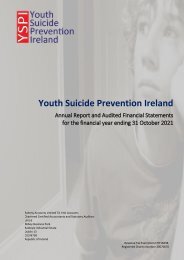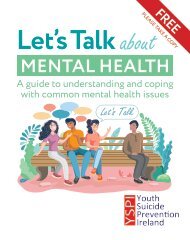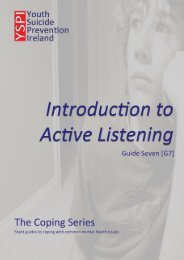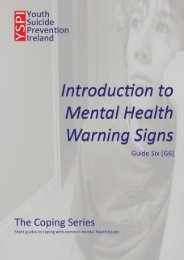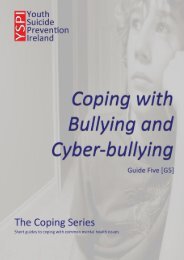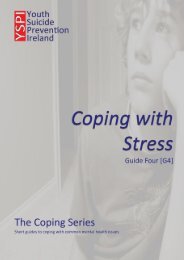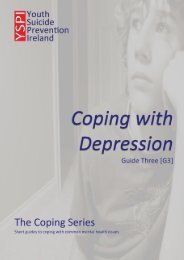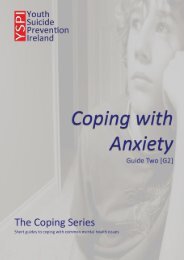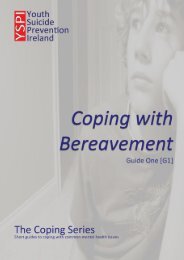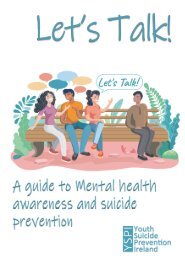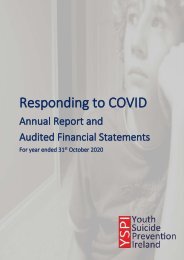Guidance and Information for Teachers and Lecturers
Teachers' guide to youth mental health and suicide prevention, now in it's 10th edition. Topics covered in this guide include: * Introduction to youth mental health awareness * Awareness of mental health risk factors * Recognising the symptoms of mental health issues * Helping someone with mental health issues * Understanding the dangers: Cyber-bullying Online Dangers Locked-away Syndrome * Supporting and developing coping strategies * Warnings signs of suicidal thoughts * Suicide Prevention and intervention * How to help and get help * Child Protection Policies
Teachers' guide to youth mental health and suicide prevention, now in it's 10th edition.
Topics covered in this guide include:
* Introduction to youth mental health awareness
* Awareness of mental health risk factors
* Recognising the symptoms of mental health issues
* Helping someone with mental health issues
* Understanding the dangers:
Cyber-bullying
Online Dangers
Locked-away Syndrome
* Supporting and developing coping strategies
* Warnings signs of suicidal thoughts
* Suicide Prevention and intervention
* How to help and get help
* Child Protection Policies
- No tags were found...
Create successful ePaper yourself
Turn your PDF publications into a flip-book with our unique Google optimized e-Paper software.
6<br />
Is it true that people who attempt to kill themselves really don’t want to die?<br />
Many people who attempt suicide are ambivalent about life. They want to live <strong>and</strong> die at the same<br />
time. But, as noted in number 1, it is not that the person really wants to die, but rather that death<br />
may seem like the only way to end the emotional pain the suicidal person may be feeling. It is the<br />
pain they want to end usually, not the life.<br />
Will a person who is deeply depressed always become suicidal?<br />
While it is true that suicidal feelings often develop in a person who is deeply depressed, the fact that one<br />
is depressed does not mean that a person will become suicidal.<br />
7<br />
8<br />
Does anyone ever impulsively try suicide <strong>and</strong> then become sorry <strong>for</strong> making<br />
such an attempt?<br />
A person at a particular moment may find the emotional pain being experienced absolutely intolerable.<br />
At a given moment, a suicide attempt might impulsively be made which, in retrospect, might be<br />
regretted.<br />
Does taking drugs or alcohol increase one’s chances of becoming suicidal?<br />
Taking drugs or alcohol in excess can exaggerate painful feelings to a point where the feelings become<br />
intolerable. In such a state, a person might attempt suicide who otherwise would not go that far.<br />
9<br />
10<br />
Is a person who attempts suicide mentally ill?<br />
All suicidal individuals are not necessarily mentally ill, though many people who attempt or<br />
complete suicide may have symptoms of mental illness, the most common being some <strong>for</strong>m of<br />
depression. It is important to note that most depression is of a temporary nature <strong>and</strong> is treatable.<br />
Is it true that gay teenagers are at higher risk <strong>for</strong> suicide than teenagers in general?<br />
Studies in the US indicate that gay, lesbian <strong>and</strong> bisexual youth account <strong>for</strong> some 30% of all youth suicides,<br />
yet constitute only about 10% of the total youth population. Thus, it is clear that such youth are at<br />
much higher risk <strong>for</strong> suicide than the youth population as a whole.<br />
11<br />
12<br />
How can one help a person who is suicidal?<br />
A person who feels that life is too painful is often feeling very worthless, perhaps unloved, perhaps<br />
isolated. Showing such individuals some real caring, by listening to them, accepting their<br />
feelings without judgment, by staying close, <strong>and</strong> getting others to be supportive, can really help.<br />
Giving time <strong>and</strong> really listening to someone in crisis is critical. It may be important to refer the<br />
person to a professional medical or mental health worker at some point.<br />
How does talking about suicide help to prevent it?<br />
Talking about suicide diffuses some of the intensity of suicidal feelings. It helps the person get connected<br />
13<br />
to the help that may be needed. It creates a climate of caring <strong>and</strong> helps to break through the loneliness<br />
<strong>and</strong> isolation a person may be experiencing. By asking someone in crisis if they are suicidal, we give that<br />
person permission to talk about possible suicidal feelings, about which they may otherwise feel they<br />
cannot, or should not, talk about.<br />
14<br />
Is<br />
suicide or attempted suicide against the law?<br />
At one time suicide or attempted suicide was against the law. In some countries it has only been<br />
within the last 20 years that suicide has ceased to be a crime.


